CRM in 2025 - Trends, Insights, Effectiveness for IT Businesses: Survey Results

Customer relationship management (CRM) systems help companies build strong customer connections, organize customer data, improve communication, and streamline sales and service processes.
For IT companies, a reliable CRM is more than just a tool; it's a key part of their strategy to grow, be more efficient, and stay ahead of the competition.
Have you ever wondered how IT companies use CRM tools to stay competitive in 2025? We did too! So, we surveyed 640 IT companies in 28 countries from March 5 -17 to gather their insights about CRM effectiveness, trends, and future expectations.
We invite you to explore what’s working, what’s not, and what’s next!
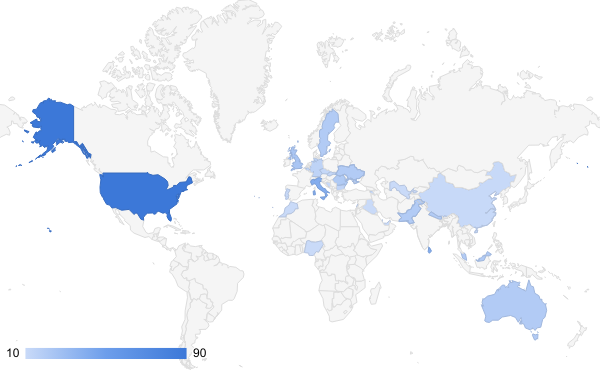
Survey Respondents’ Profile
The survey respondents, in addition to diverse demographics, hold various positions within their companies. The majority hold leadership positions: 41.4% are founders or CEOs, 19 % are marketing managers, followed by CTOs, who account for 15.5% of respondents. 12.1% are business development managers, while 8.6% are project managers. A small group (3.4%) fall into other positions, including HR, Assistant Account Managers, and Growth Managers.
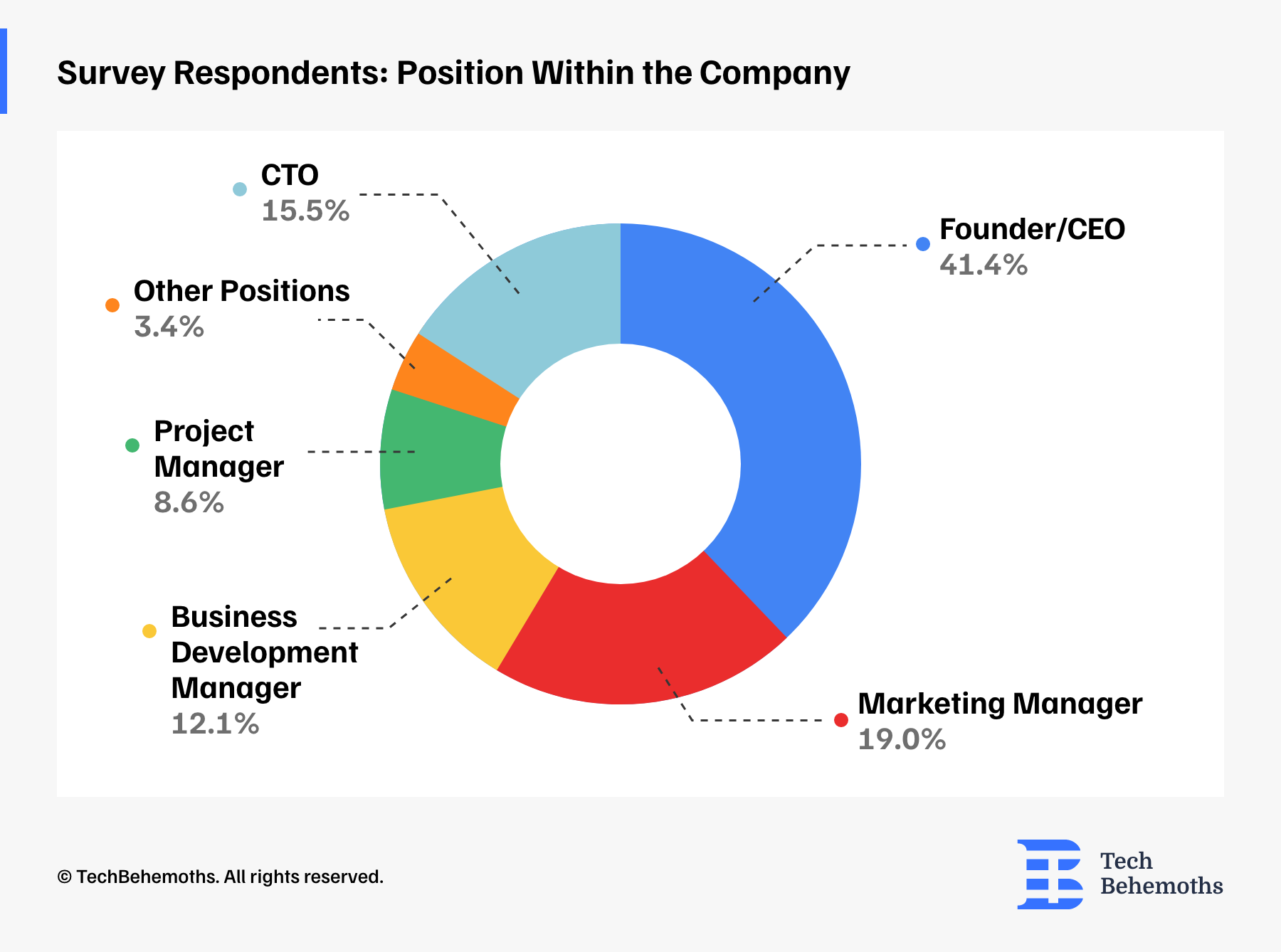
Regarding the size of the respondents' companies, the largest share of respondents comes from medium-sized companies with 10-50 employees. This group is divided equally between businesses with 10-20 employees and 20-50 employees, each representing 25%. This is followed by 29.7% of respondents from large companies with over 50 employees. The smallest share, 20.3%, is made up of professionals working in small companies with 2-9 employees.
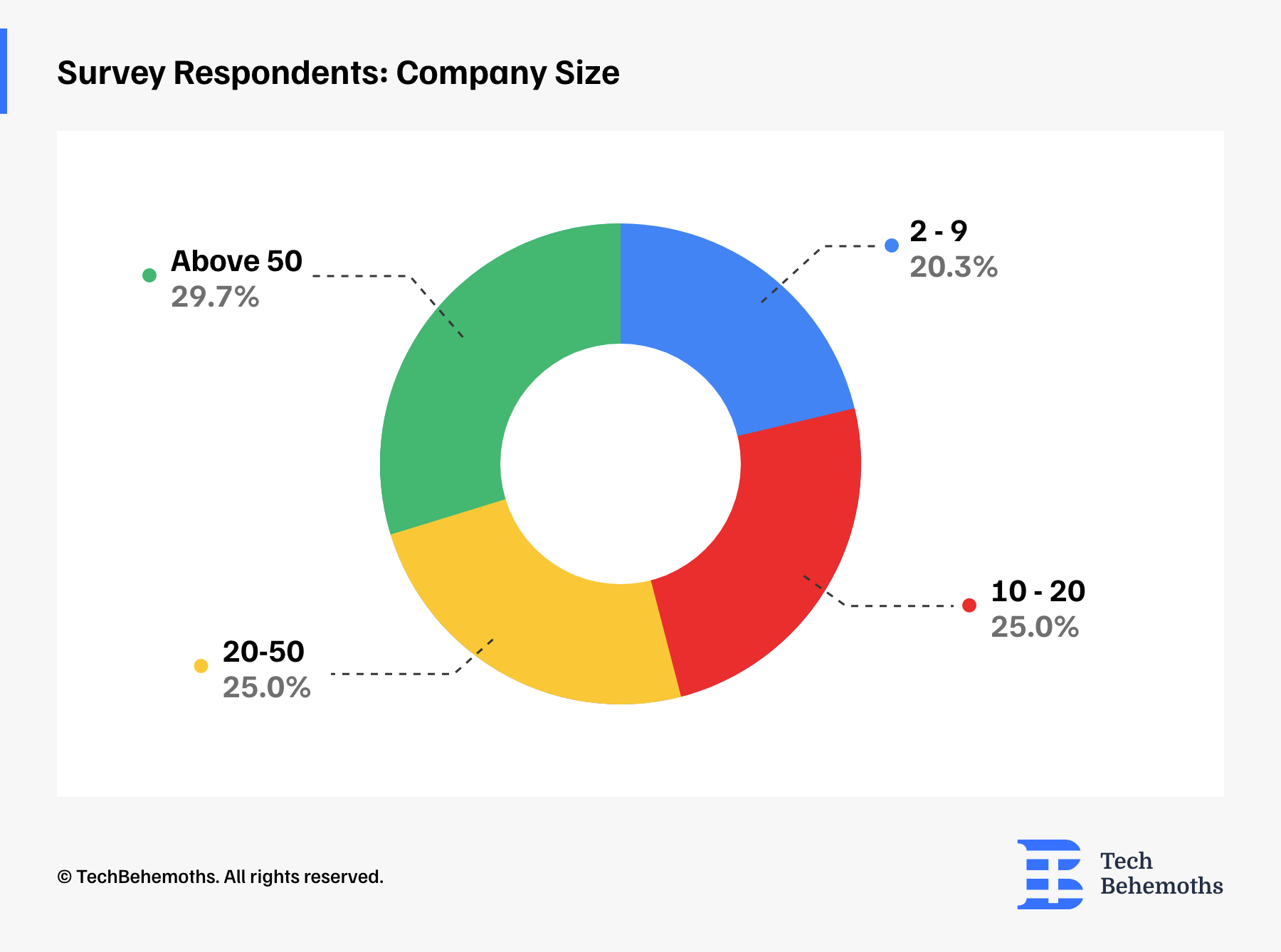
Which CRM Systems Do Businesses Prefer?
When asked about their current CRM solutions, most survey respondents chose cloud-based systems, at 40.6%, due to scalability, ease of integration, and automatic updates. Examples include Salesforce, HubSpot CRM, and Zoho CRM.
Custom CRMs and combined CRM solutions came in second with 18.8% each. These options highlight the importance of flexibility and the fact that companies are looking for tools that address their unique workflows and integrate seamlessly with existing systems.
Smaller segments of respondents rely on on-premise (4.7%) and open-source (6.3%) CRMs. Examples of on-premise solutions include Microsoft Dynamics 365 and SAP CRM. For open-source CRMs, businesses often turn to systems like SuiteCRM, Odoo, or EspoCRM. Their lower adoption suggests challenges like limited scalability or technical requirements.
Interestingly, 9.2% of companies chose "Other" solutions, providing a glimpse of alternative approaches. Some rely on tools like Notion, spreadsheets, Jira, or niche CRMs like ASPIRE CRM. Others have invested in building their own CRM platforms.
Finally, only 1.6% of survey respondents operate without a CRM, highlighting what an important role these systems play in modern business operations.
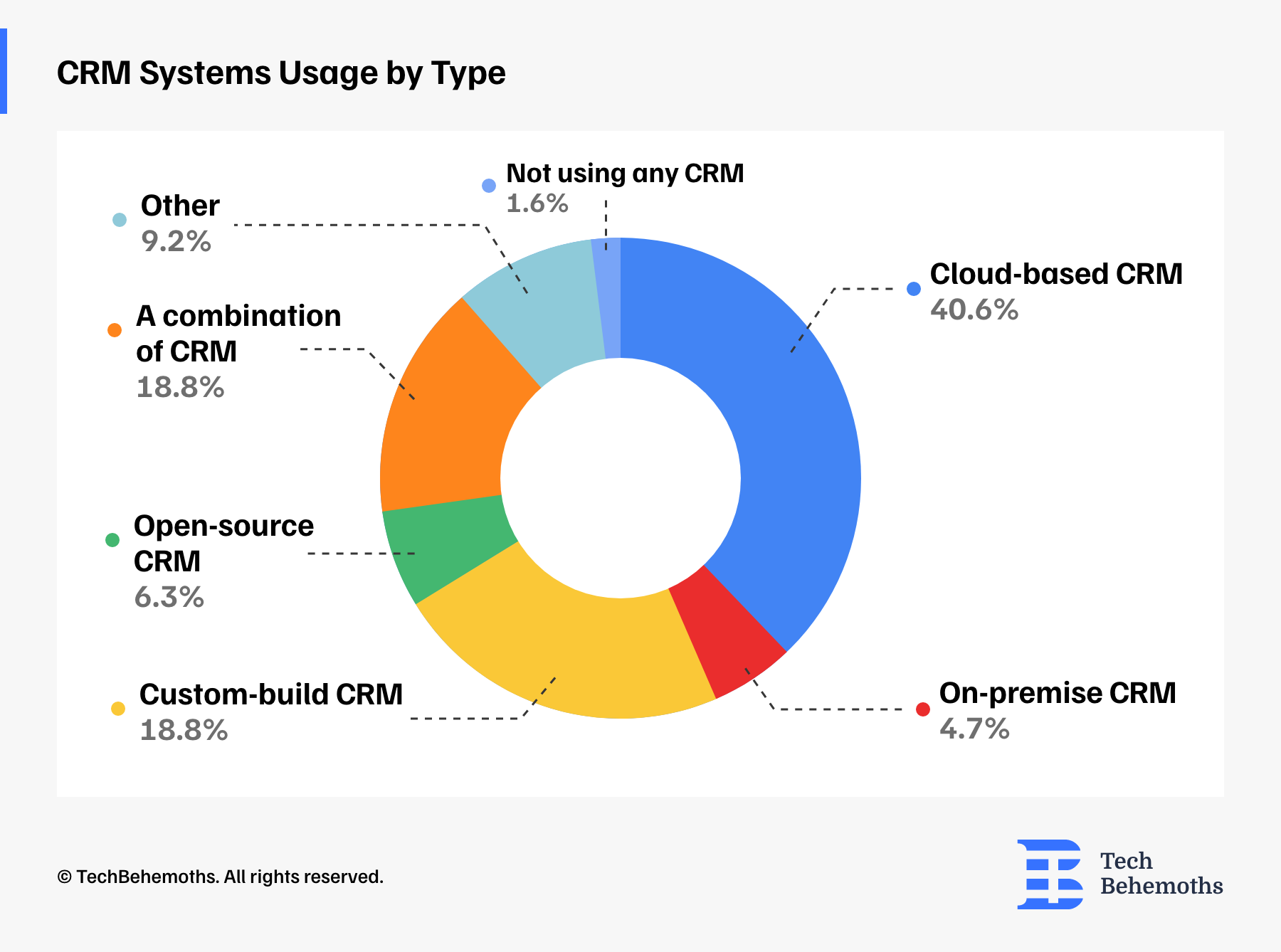
CRM Adoption: How Long Companies Have Been Using CRM Systems
Survey data shows that CRM adoption is still a work in progress for many companies. The largest group of respondents - 46.90% have been using CRM systems for 1-3 years. Other 12.50% have been using CRM systems for less than 1 year, which shows that some companies are just getting started with CRM.
Furthermore, 18.8% have been using CRM systems for 3 to 5 years, indicating a level of experience. Meanwhile, 21.9% of companies have been using CRM systems for over 5 years, suggesting that these businesses have well-established CRM practices and have likely integrated them into their daily operations.
Summarizing this nearly 60% of companies have used CRM systems for up to 3 years. Fewer companies have used them longer. This trend shows that many companies are still working on adopting or improving their CRM systems.
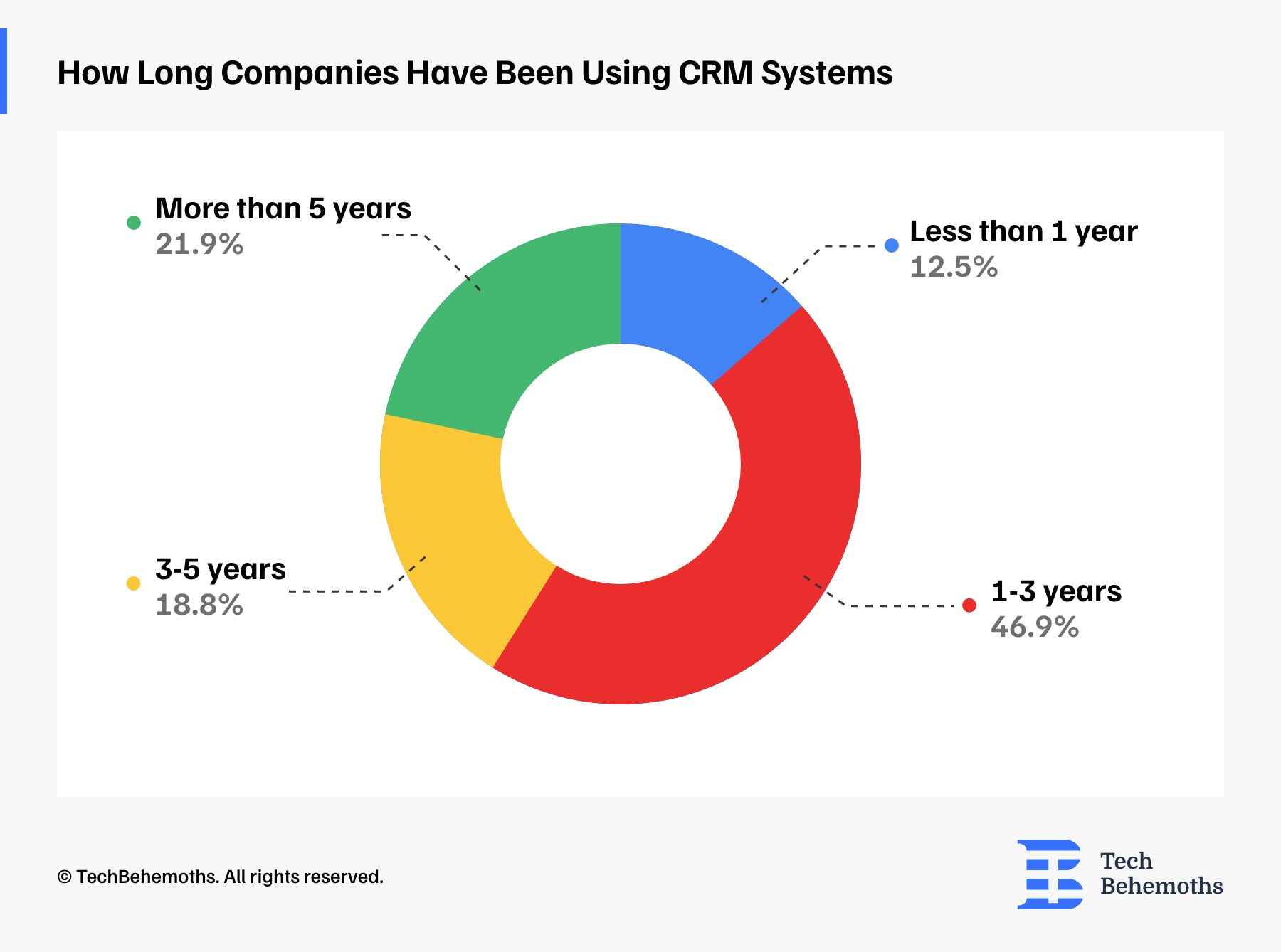
Primary Reasons for Adopting a CRM System
When asked why companies rely on CRM systems, the survey reveals clear priorities.
25% of respondents believe that CRM systems are essential for lead and client management. They help track contacts, organize information, and effectively strengthen customer relationships.
Leads Management, client management, and keeping track of contacts.
Binmile, USA
Managing leads, opportunities, projects, and customer and partner relationships.
IT Consultis, China
The main reason for using a CRM system is to manage the growing number of projects and customers.
Digicode Europe, Slovakia
Another 20% cited improving sales and automation as the main reasons for adopting a CRM system.
As our sales leads grew, tracking them in detail and automating the process became essential. Excel was no longer efficient for managing a larger client base, especially with manual data entry. We needed a CRM for shared access across the sales team.
AltaCode LLC, Armenia
15% mentioned centralized data management as a key benefit. Businesses value having all customer information in one place, ensuring quick access.
The primary reason is to centralize customer information so we can build stronger relationships. With a CRM, all customer data and interactions are stored in one place, enabling our team to engage with clients more effectively, tailor communications, and ultimately drive sales and retention.
Startbit IT Solutions, India
Similarly, 15% opted for implementing CRM to improve customer relationships.
To improve customer relationships, enhance sales, and streamline business processes by centralizing and managing customer data effectively.
Global Surf Digital, UAE
Our primary reason for adopting a CRM system is to improve customer relationship management by streamlining communication, enhancing lead tracking, and ensuring better follow-ups. The system helps us manage client interactions efficiently and deliver personalized experiences, ultimately driving growth and customer satisfaction.
Trigma, USA
For 10% of respondents, task and workflow management stood out as a top benefit. For another 10% of survey respondents, marketing optimization was another reason for adoption.
Enhanced marketing campaigns – Optimizes email marketing, promotions, and ad targeting based on customer preferences and engagement history.
E-Noblevital, Nigeria
Finally, 5% of respondents focused on statistics and data analysis. They appreciated how CRMs provide detailed reports, which lead to more strategic decisions.
Our services are custom, so we need to track the effect on marketing and provide CRM as a solution for customers.
Coderfy, Ukraine
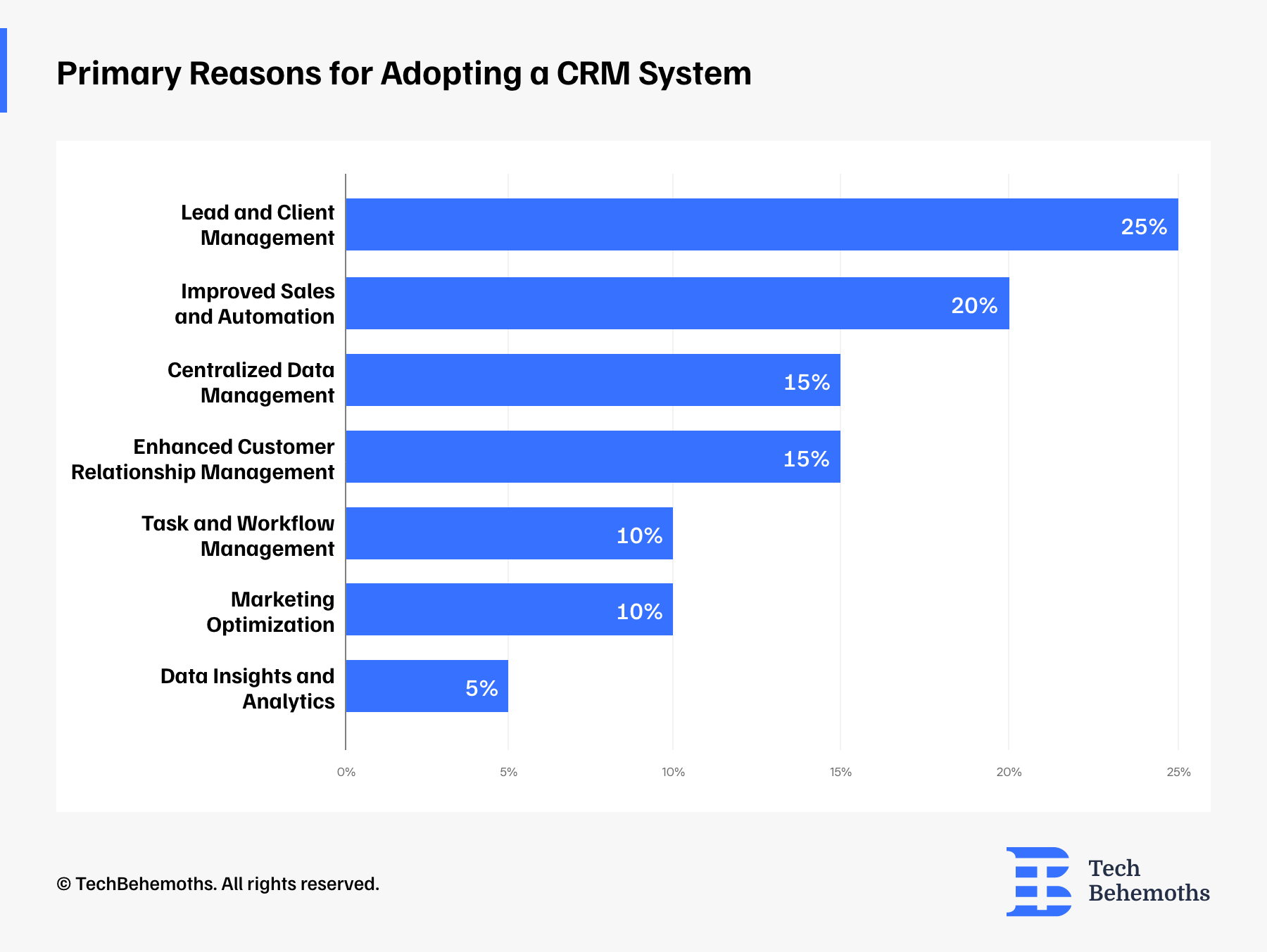
Overall, companies rely on CRMs to improve efficiency, strengthen customer relationships, simplify sales processes, provide detailed analytics, and support business growth. All of the example statements directly reflect the reasoning behind CRM adoption as mentioned in the survey responses.
IT Industries with Faster CRM Tool Adoption
There are industries where faster adoption of CRM tools can be seen.
Survey results indicate that 48.40% of respondents noticed faster CRM adoption by SaaS companies, highlighting the importance of CRM tools in subscription-based and B2B environments.
Software Development ranks second with a 21.90% adoption rate, as these companies often manage multiple projects and clients simultaneously, making CRM tools essential for effective client communication and project tracking.
IT Consulting comes third at 17.20%, as these firms manage diverse client portfolios and proposals. In contrast, mobile app development shows a relatively low adoption rate of 4.70%.
Other IT industries account for 7.80%, indicating limited usage likely due to their specific workflows.
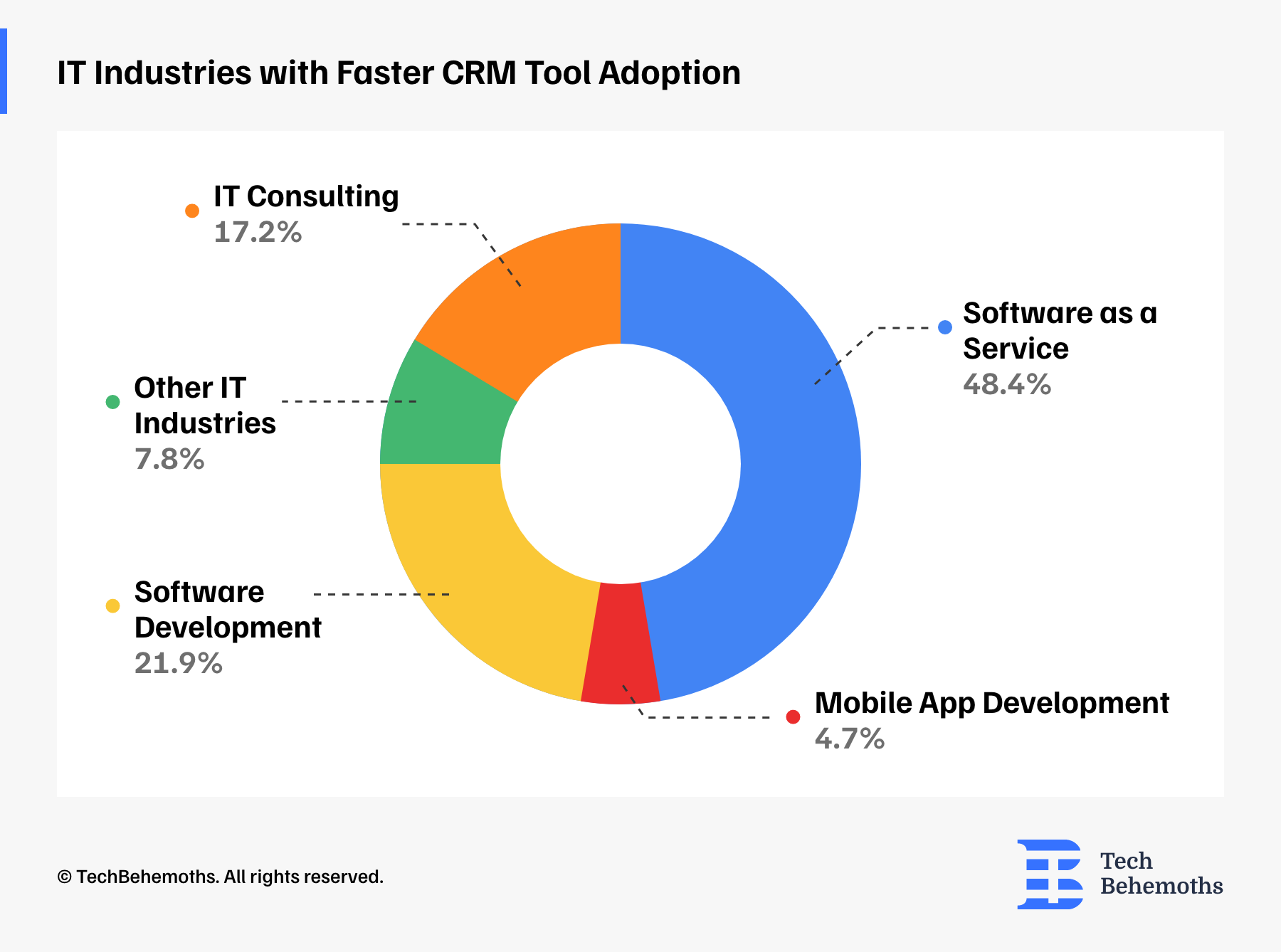
CRM Receives a 4.25 Rating: How Effective Is It?
The CRM system received an average rating of 4.25, with 81.3% of respondents giving positive (4—or 5-star) feedback. Most companies found it very effective, and only a very small group rated it moderately effective—2 stars (3.1%).
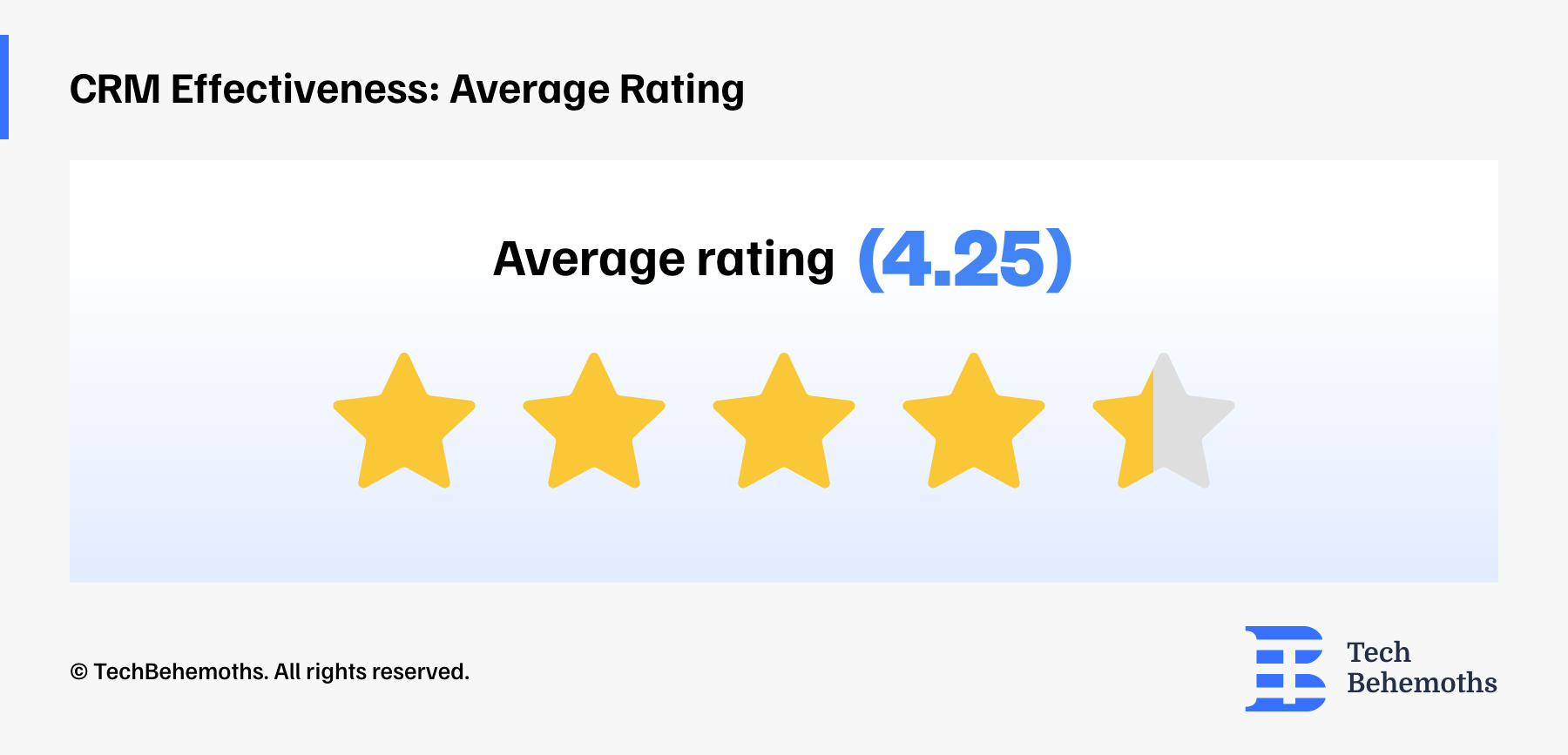
Furthermore, we asked companies which area of their business has improved the most since implementing a CRM. Here are the results, let's take a look!
37.5% of Companies Noticed Improved Lead Management with CRM Implementation
Survey data shows that lead management has improved the most since companies started using a Customer Relationship Management (CRM) system. About 37.5% of companies reported this improvement. Team productivity is the second area that improved, with 17.2% of companies seeing growth there. Marketing automation and better data insights also improved, with gains of 12.5% and 10.9%, respectively. Customer retention, sales enablement, and increased revenue showed smaller but still valuable improvements.
Key Metrics for Measuring CRM Success
When respondents were asked what metrics they use to measure the success of their CRM implementation, the most common metric cited was Improved Lead Conversion Rates, mentioned by 45.3% of participants. This was followed by Increased Revenue and Enhanced Customer Satisfaction, each prioritized by 21.9% of respondents. Fewer companies focused on Reduced Churn Rate (6.3%) or other metrics (4.6%). This suggests a preference for measurable sales and customer-related outcomes.
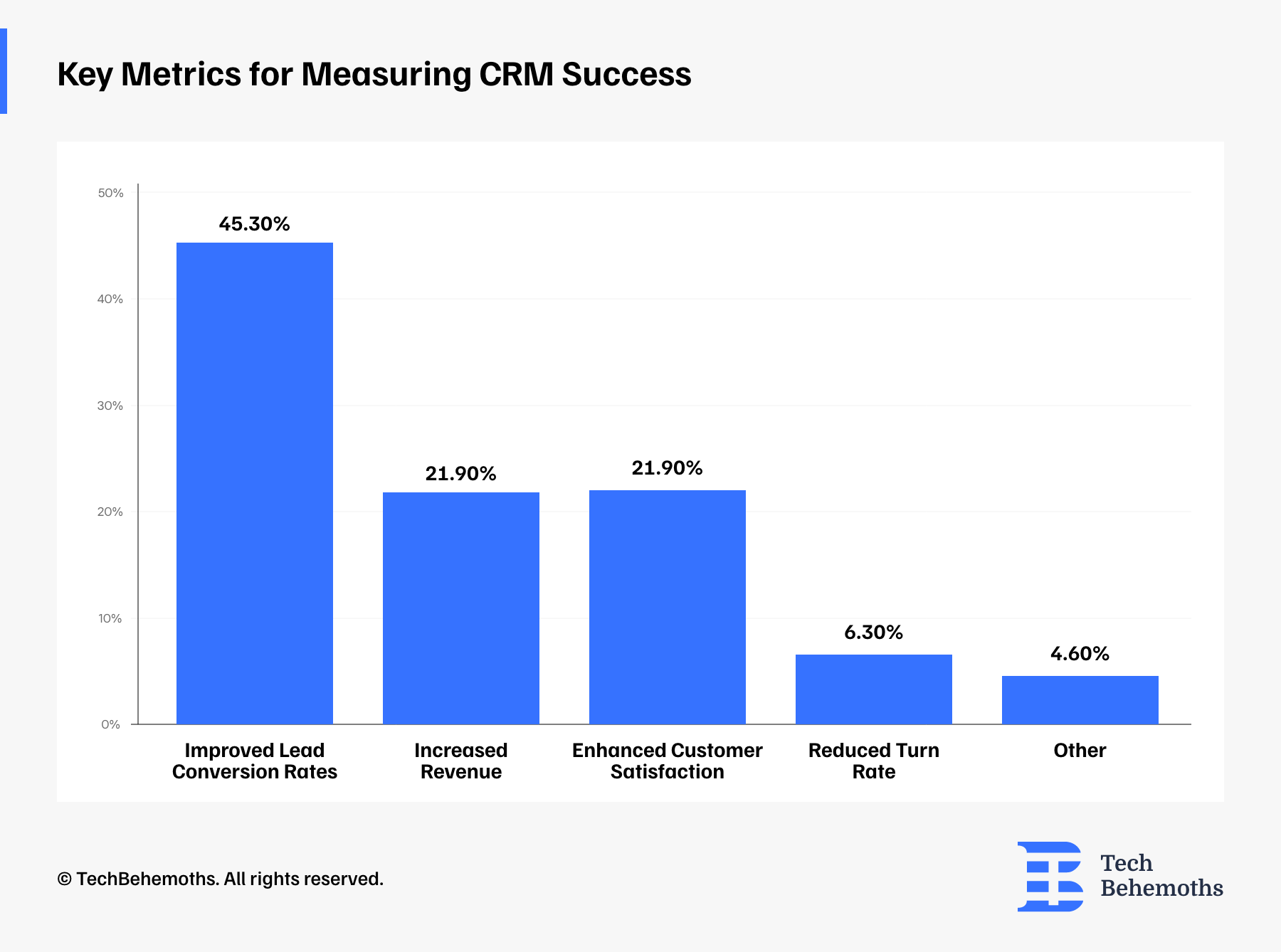
CRM Challenges: Why 39.10% Struggle with Integration and Customization
IT companies face several challenges with their CRM systems. Most survey respondents—39.10%—noted that a lack of integration with other tools and limited customization options are major issues. This shows that CRMs need to be more flexible and easier to connect with.
Another challenge is the high cost of CRM systems, which 34.40% of respondents mentioned. Additionally, 25% of participants said that not having enough in-house expertise or training is a problem. This highlights the need for user-friendly designs and training programs to help users.
Complexity is also an issue, affecting 19% of respondents who find CRMs hard to use. Data migration problems concern 15.60% of respondents when switching to new systems.
Finally, only 14.30% of participants reported having no issues with their CRM, indicating that user experience still needs improvement.
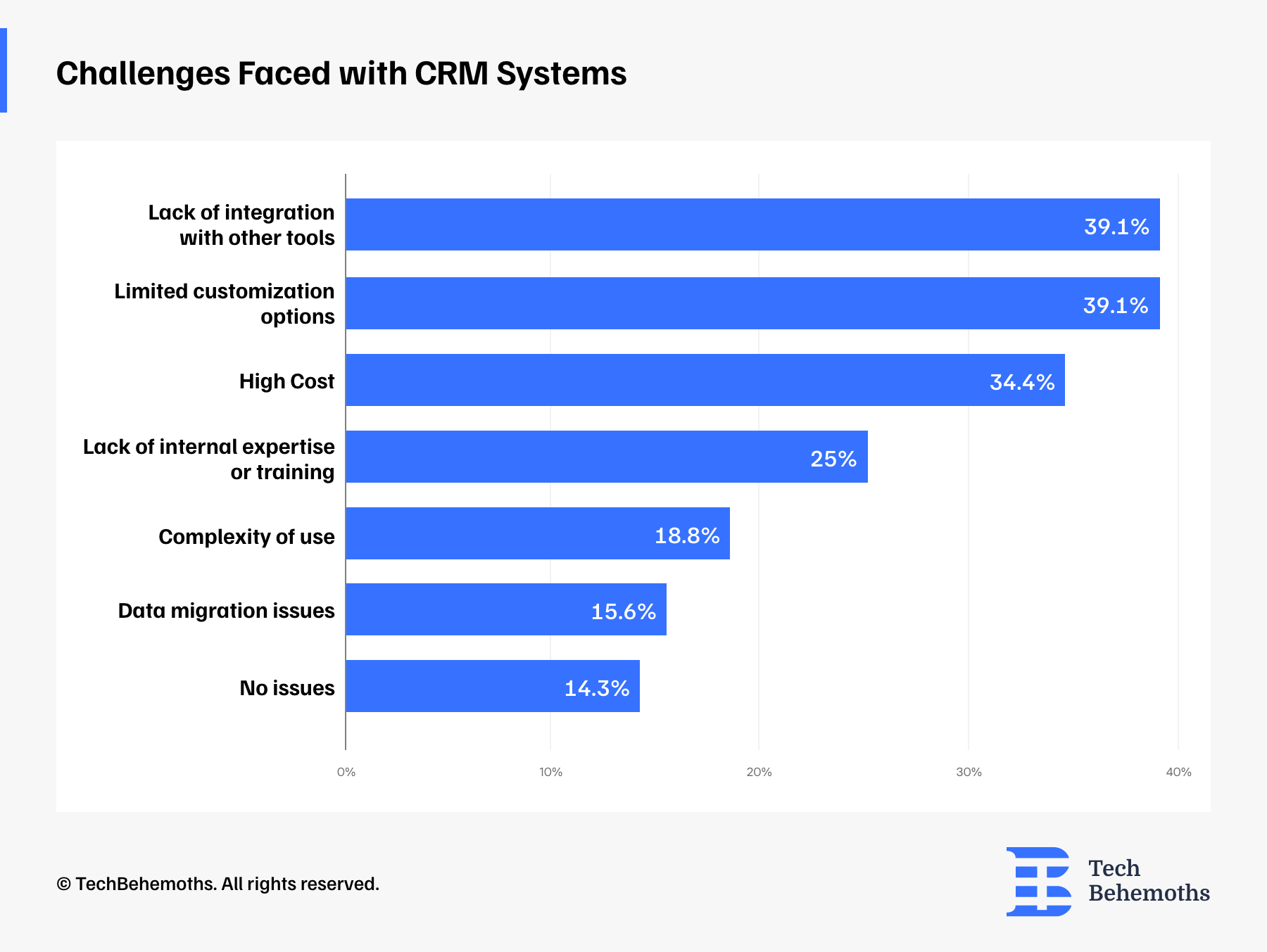
The Most Important Improvements Needed for CRMs
Further, our survey explores what companies consider to be welcome improvements in their CRMs. The top response, selected by 42% of participants, was the incorporation of AI and automation to predict customer needs and automate tasks.
AI can help CRMs suggest the right technical solutions based on customers' needs, previous setups, and successful outcomes.
Lexis Solutions, Bulgaria
35% of respondents requested better tool integration, which is the second most common request. Companies want their CRMs to connect smoothly with platforms like Jira, cloud services, and helpdesk software.
Easy integration with tools like Jira, Trello, or ClickUp can help teams link client interactions to project timelines and deliverables.
Ledger Labs Inc., USA
30% of companies want CRMs that allow for customization. They prefer systems that offer personalized dashboards, workflows, and open-source features to fit their specific needs.
18% of respondents want better data protection. 15 % believe pricing models should depend on the company’s size or location, and 12% want CRMs to be simple, fast, and easy to use.
Finally, 5% of respondents desire more guides, videos, and tutorials to help them use CRMs effectively.
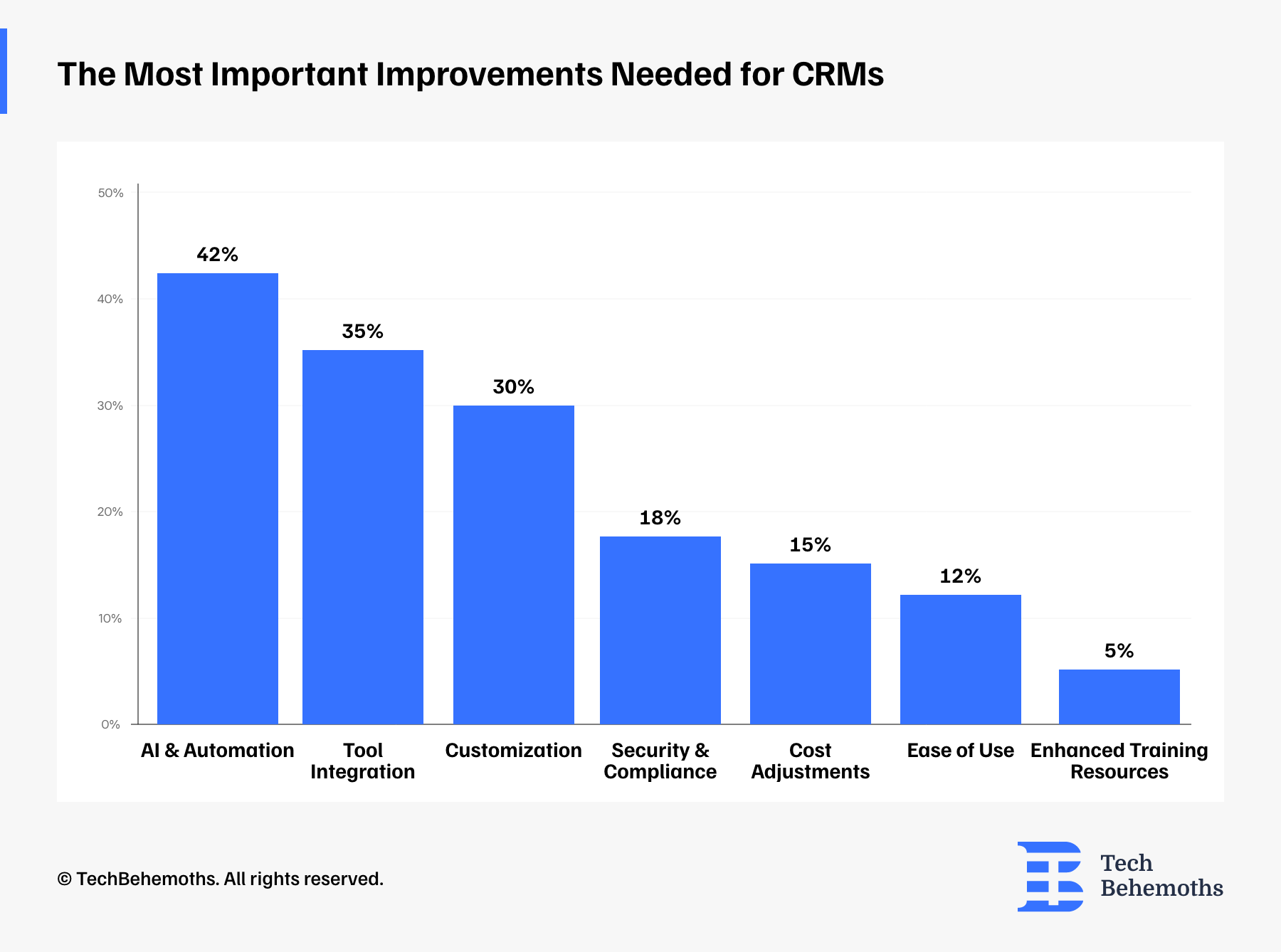
What Makes Leading CRMs Stand Out in 2025?
In 2025, the most important CRM features reflect a strong focus on innovation, efficiency, and connectivity. Leading the way is AI-driven insights, with 73.4% of respondents highlighting its importance for analyzing data and improving decisions. Close behind is automation, valued at 67.2% for saving time and reducing errors.
Real-time analytics comes next, with 48.4% prioritizing quick and actionable insights. Integration with other tools is also key, as 45.3% see it as essential for seamless workflows. Predictive analytics follows at 35.9%, as businesses focus on anticipating customer behavior.
Personalization is still a trend, with 34.4% valuing customized customer journeys. Social media integration (31.3%) remains relevant for engagement, while mobile access (29.7%) is seen as an expected feature. Lastly, data privacy and security (21.9%) are important but not the main focus.
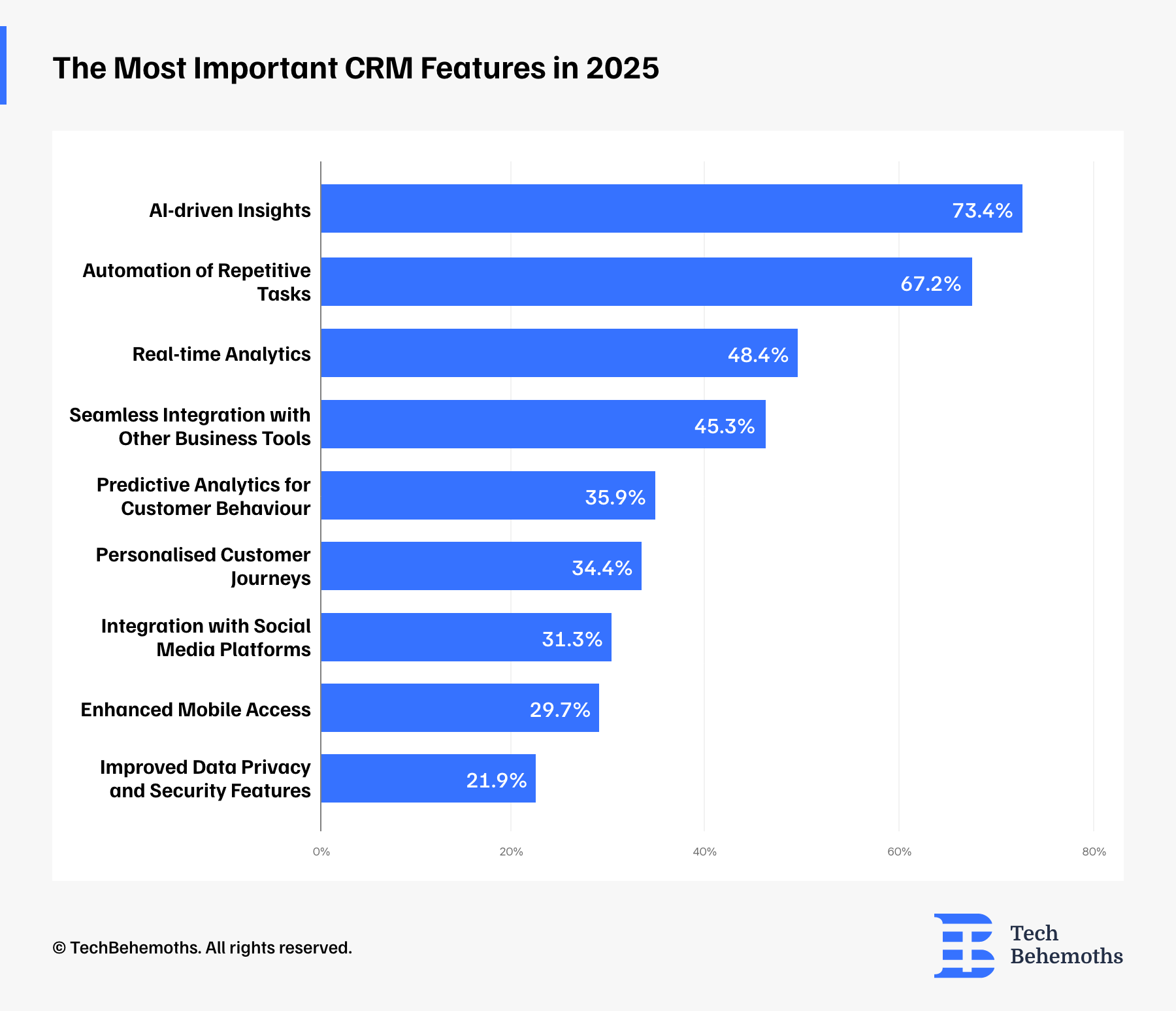
According to our survey, the most successful CRM providers in 2025 will be defined by:
-
Seamless integrations with other tools (42.2%)
-
Superior customization capabilities (35.9%)
-
Best-in-class data security (12.5%)
-
Competitive pricing models (9.4%)
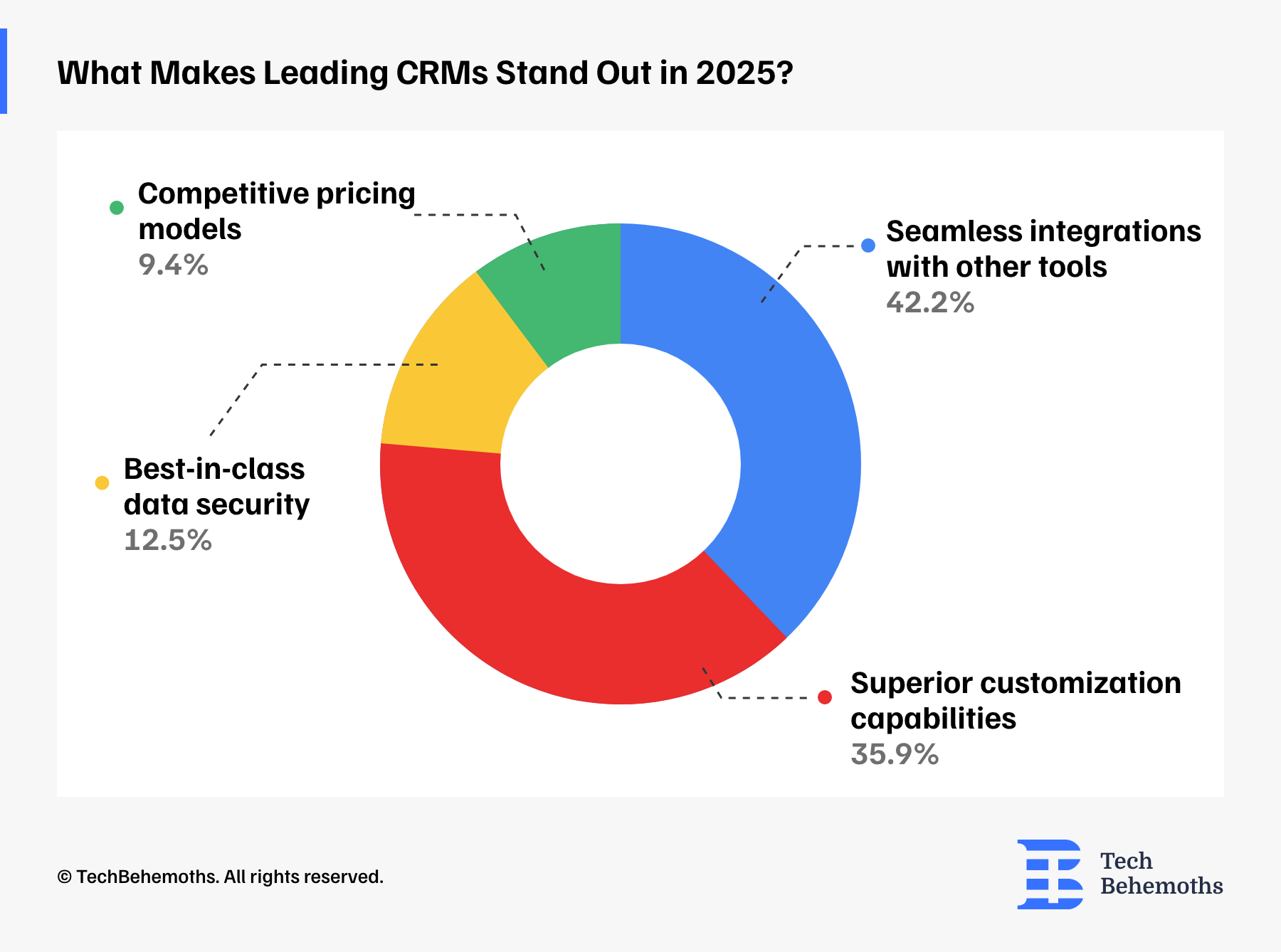
The top priorities are clear: AI, automation, and integration are shaping the future of CRM.
79.2% Believe AI Should Be Integrated into CRM by 2025
According to survey results, AI and machine learning are the top emerging technologies that should be integrated into Customer Relationship Management (CRM) systems. With 79% of respondents prioritizing these technologies, it is clear that they are considered essential for the future of CRM. The Internet of Things (IoT) follows at 12.9%, while blockchain technology for data security is a lower priority, receiving only 3.2%. Other emerging technologies account for 4.6%.
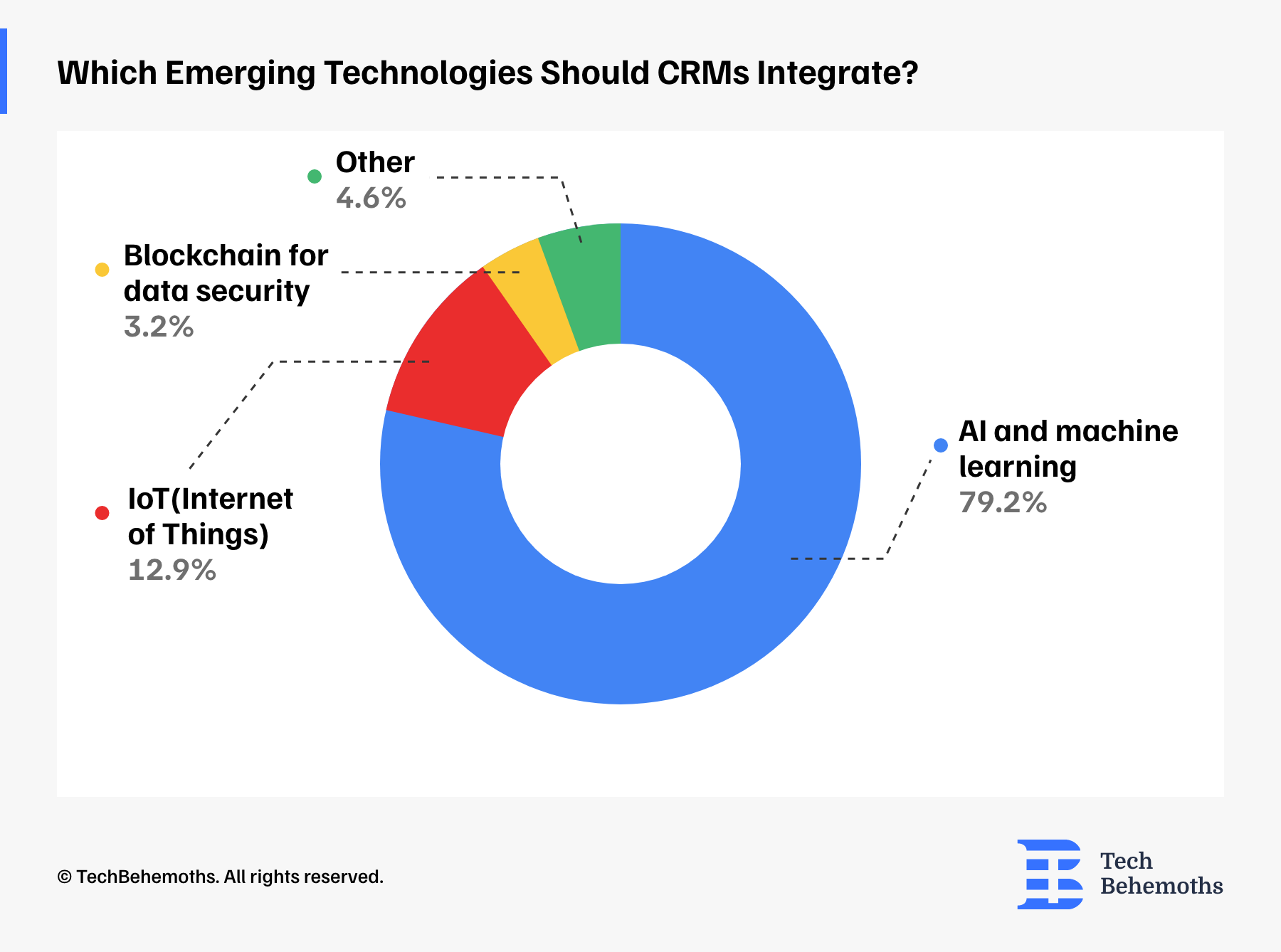
AR/VR in CRMs: 37.5% Say It’s Unlikely Anytime Soon
Compared to AI, which is seen as a top feature for CRM integration, augmented reality (AR) and virtual reality (VR) integration is far less prioritized. Only 34.3% expect AR/VR to be used widely in CRM, while 37.5% believe it is unlikely to happen at all. This shows that even though AR/VR can create unique customer experiences, for now it is seen as an additional feature rather than an essential part of CRM systems.
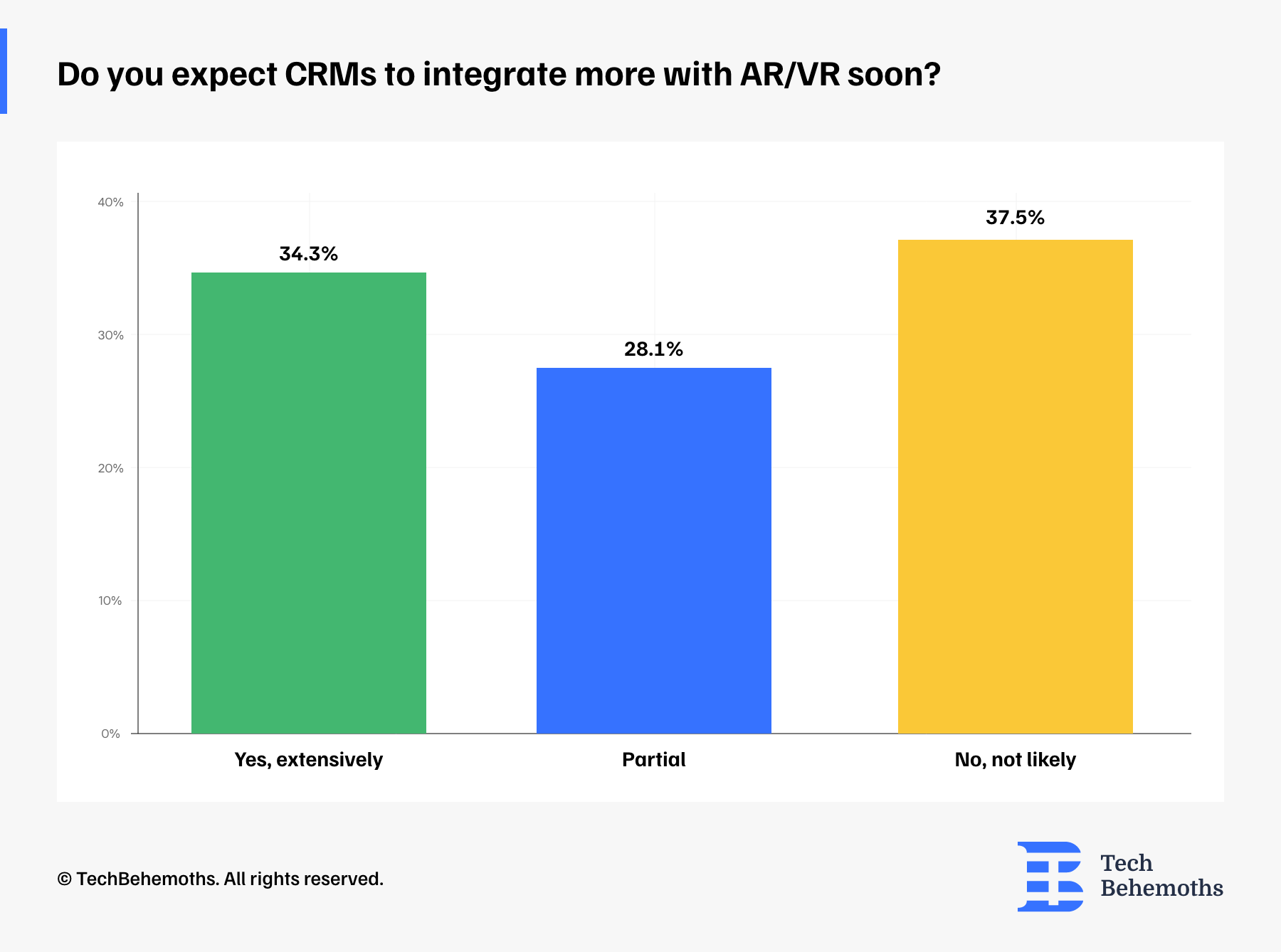
For 2025 - 43.8% of Companies Will Keep Their Current CRM
Looking ahead to 2025, 43.8% of respondent companies do not plan to upgrade or switch their CRM systems, indicating they are satisfied with their current setup. In contrast, 26.6% are planning to make a change, suggesting they see potential benefits in a new system. Meanwhile, 29.7% are unsure, indicating that they may need more time or information before making a decision.
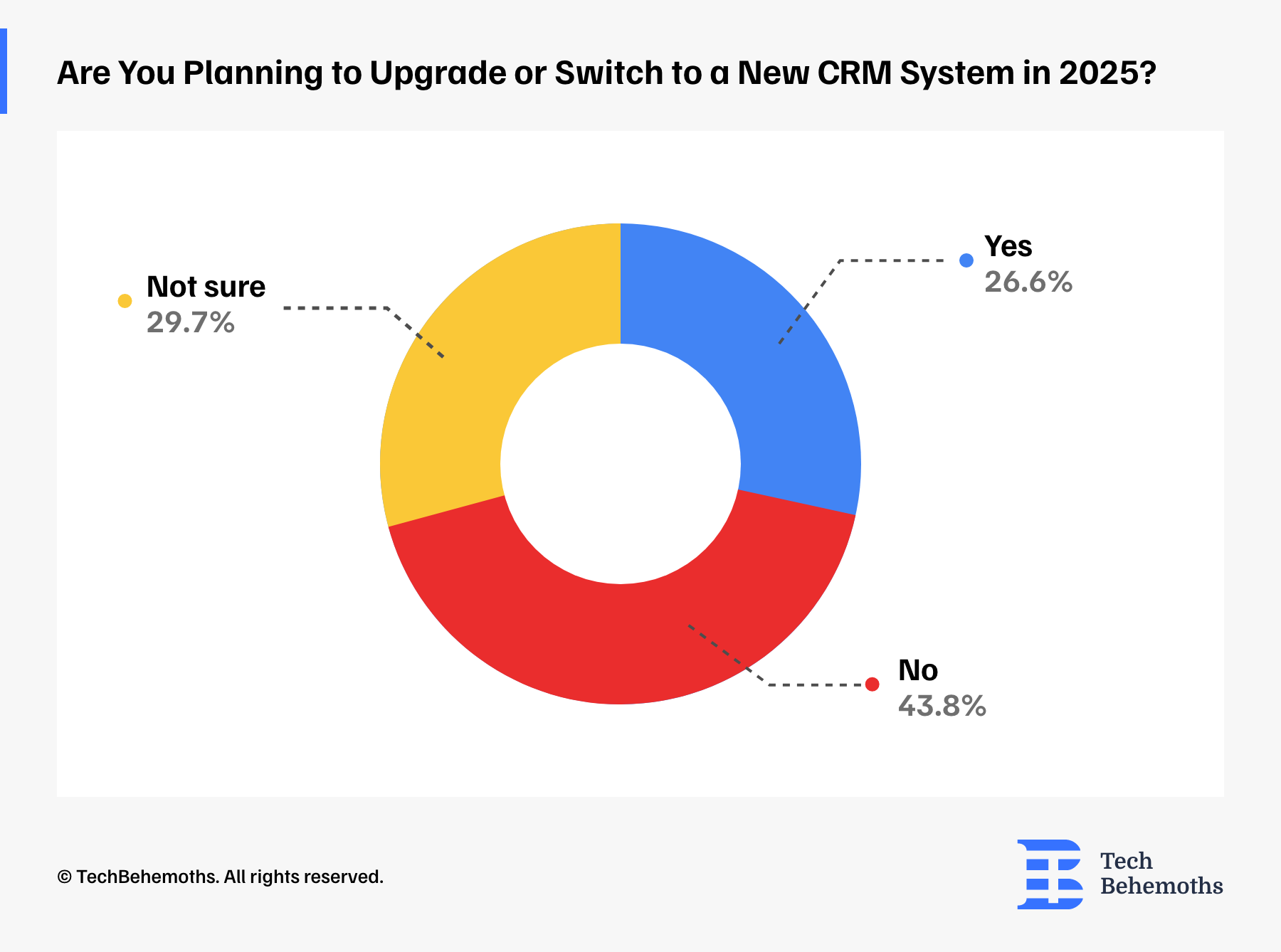
Summing Up
Our survey shows that Customer Relationship Management (CRM) systems are important support for IT companies that want to grow, improve their processes, and build strong relationships with clients.
The findings indicate artificial intelligence, automation, and integration are key components for the future of CRM systems. However, many organizations are still in the process of fully adopting these systems.
While challenges such as integration and customization remain, companies tend to use smarter tools and strategies to remain competitive.
CRM is not just a tool; it is the bridge between customer interactions, lasting relationships, and business growth.
Partner Companies
The survey was not limited to any geographical region or country and its main target was the global community of IT companies and web agencies. As such, survey respondents come from 640 different companies located in 28 countries across the globe. On this occasion, TechBehemoths is proudly announcing and crediting the list of partner companies that helped spread the word and gather answers for this survey.
- Buinsoft Technology, Czech Republic
- Mobiteam, Germany
- D4A Cloud ERP Solutions, Qatar
- Saivra Technologies, USA
- Startbit IT Solutions, India
- Aspire Agency, Iraq
- Aroasis Softech, India
- New Perspective Marketing, USA
- Binmile, USA
- Timspark, United Kingdom
- Global Surf Digital, UAE
- AltaCode LLC, Armenia
- minic studio, Romania
- Futurex Tech, Nepal
- Elegant Digital Solutions (Pvt) Ltd, Sri Lanka
- M&A Digital, Portugal
- The Digital Marketing People., Canada
- E-Noblevital, Nigeria
- SoluteLabs, USA
- Pixelweb, Morocco
- Coderfy, Ukraine
- Codezela Technologies, Sri Lanka
- Stratégies TI Gouvernord, Canada
- I Concept Digital, Malaysia
- Imagint, Malaysia
- Wisemen, Belgium
- Bacancy, India
- Lexis Solutions, Bulgaria
- Technologies Private Limited, India
- SyntelligenceIT Pvt Ltd, Sri Lanka
- Exceed IT, South Africa
- Flowmatters, Romania
- Kangaroo Agency, India
- Zendev AB, Sweden
- Ledger Labs Inc., United States
- Moxman, Australia
- Eurosoft, Uzbekistan
- Codefia, Poland
- Skillsquared INC, USA
- Trigma, USA
- Ministry of Programming, Bosnia and Herzegovina
- Labnify, USA
- Thunderbolt Technologies, United Kingdom
- Digicode, Slovakia
- Qodeyard, India
- Mega Vectors, Pakistan
- DTC Infotech, USA
- Wireless Computer Services, Nigeria
- BKP Infotech, Australia
- Pagoda Labs Pvt. Ltd., Nepal
- IT Consultis, China
- IT Brick Soft, Uzbekistan
- PROCRM, Ukraine
- AlphaBOLD, California
- Neobot Tech, Nigeria
- Teners, Nigeria
- Primal Ape Consulting, Lebanon
- Regalia Solutions, Sri Lanka
- Walkers Tours, Sri Lanka